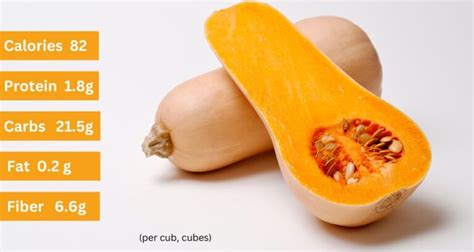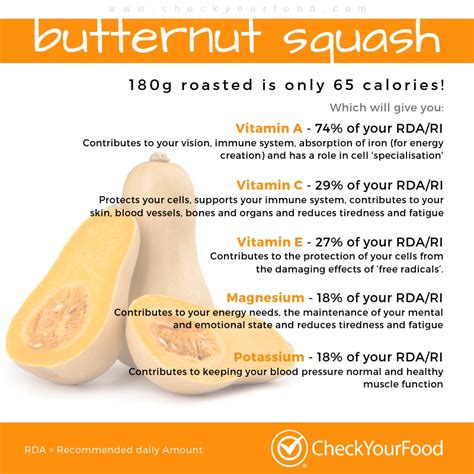The world of nutrition is filled with a plethora of vegetables, each offering its unique set of health benefits. Among these, butternut squash stands out due to its rich nutritional profile and versatility in cooking. This winter squash is not only delicious but also packed with vitamins, minerals, and antioxidants that can significantly contribute to a healthy diet. As we delve into the realm of butternut squash, it becomes evident that incorporating this vegetable into our meals can have a profound impact on our overall well-being. From supporting immune function to potentially reducing the risk of chronic diseases, the health benefits of butternut squash are multifaceted and compelling. Whether you're a health enthusiast or simply looking to diversify your culinary repertoire, understanding the advantages of butternut squash can inspire a new appreciation for this nutritious food.
Butternut squash is often overlooked in favor of more popular vegetables, but its nutritional value and culinary potential make it a gem worth exploring. It is a rich source of vitamin A, vitamin C, potassium, and fiber, among other essential nutrients. These components work synergistically to provide a range of health benefits, from enhancing immune function and supporting healthy digestion to promoting healthy skin and reducing inflammation. Furthermore, the antioxidants present in butternut squash can help protect cells from damage, potentially lowering the risk of chronic diseases such as heart disease, diabetes, and certain types of cancer. The combination of its nutritional richness and potential health benefits makes butternut squash an excellent addition to a balanced diet.
The appeal of butternut squash extends beyond its health benefits to its culinary versatility. It can be prepared in a variety of ways, including roasting, boiling, mashing, and sautéing, making it a versatile ingredient for numerous dishes. Whether used in soups, stews, salads, or as a side dish, butternut squash adds a delicious and nutritious twist to any meal. Its sweet, nutty flavor and smooth texture make it a favorite among both children and adults, facilitating its incorporation into family meals and special occasions alike. As the awareness of healthy eating continues to grow, butternut squash is emerging as a popular choice for those seeking to enhance their dietary habits without compromising on taste.
Introduction to Butternut Squash
Butternut squash belongs to the Cucurbitaceae family, which includes other types of squash and melons. It is characterized by its distinctive bell-shaped body and long, straight neck, with a smooth, tan skin that turns a deep orange when ripe. The flesh of the butternut squash is what makes it particularly valuable, offering a rich source of nutrients and a delicious, slightly sweet flavor. Understanding the origins, nutritional profile, and preparation methods of butternut squash can help unlock its full potential as a health-promoting food.
Nutritional Profile of Butternut Squash
The nutritional profile of butternut squash is impressive, making it an excellent choice for those looking to enhance their diet with essential vitamins, minerals, and antioxidants. Key nutrients found in butternut squash include:
- Vitamin A: Essential for vision, immune function, and skin health.
- Vitamin C: Plays a crucial role in immune function, collagen production, and iron absorption.
- Potassium: Helps maintain healthy blood pressure, promotes bone health, and supports muscle function.
- Fiber: Aids in digestion, supports healthy blood sugar levels, and promotes satiety.
- Antioxidants: Help protect cells from oxidative damage, reducing the risk of chronic diseases.
Health Benefits of Butternut Squash
The health benefits of butternut squash are extensive, thanks to its rich nutritional profile. Some of the key advantages of incorporating butternut squash into your diet include:
- **Immune System Support**: The high content of vitamin A and C in butternut squash makes it an excellent food for boosting the immune system.
- **Eye Health**: The vitamin A in butternut squash is crucial for maintaining healthy vision and can help prevent conditions such as night blindness and age-related macular degeneration.
- **Digestive Health**: The fiber in butternut squash supports healthy digestion, preventing constipation and promoting the growth of beneficial gut bacteria.
- **Antioxidant Properties**: The antioxidants in butternut squash can help reduce inflammation and protect against chronic diseases such as heart disease, diabetes, and certain cancers.
Culinary Uses of Butternut Squash
Butternut squash is incredibly versatile in the kitchen, offering a range of preparation methods to suit various tastes and dietary needs. Some popular ways to prepare butternut squash include:
- **Roasting**: Bringing out the natural sweetness of the squash by roasting it in the oven with herbs and spices.
- **Soups and Stews**: Adding butternut squash to soups and stews for a nutritious and filling meal.
- **Mashing**: Similar to mashed potatoes, butternut squash can be boiled and mashed with butter and milk for a delicious side dish.
- **Salads**: Roasted or boiled butternut squash can be added to salads for a nutritious and flavorful twist.
Growing and Storing Butternut Squash
For those interested in growing their own butternut squash, it's essential to understand the conditions required for its cultivation. Butternut squash prefers well-drained soil and full sun, making it a suitable crop for gardens with ample sunlight. After harvesting, butternut squash can be stored in a cool, dry place for several months, allowing for a prolonged period of enjoyment. Proper storage techniques can help maintain the quality and nutritional value of the squash, ensuring it remains a healthy and delicious addition to meals throughout the year.
Conclusion and Final Thoughts
In conclusion, butternut squash is a nutritional powerhouse that offers a multitude of health benefits and culinary delights. Its richness in vitamins, minerals, and antioxidants makes it an excellent choice for supporting immune function, promoting healthy digestion, and reducing the risk of chronic diseases. Whether you're a seasoned chef or a health-conscious individual, incorporating butternut squash into your diet can have a significant impact on your overall well-being. As you explore the world of butternut squash, remember to appreciate its versatility, nutritional value, and the joy it can bring to your meals and health.
Call to Action
As we wrap up our journey into the world of butternut squash, we invite you to share your thoughts, experiences, and favorite recipes featuring this versatile vegetable. Whether you're a long-time fan of butternut squash or just discovering its benefits, your input can help inspire others to embrace the nutritional and culinary potential of this incredible food. Feel free to comment below, share this article with friends and family, or explore other resources to deepen your understanding of healthy eating and nutrition. Together, let's celebrate the joy of healthy living and the delicious, nutritious world of butternut squash.
What are the key nutrients found in butternut squash?
+
Butternut squash is rich in vitamins A and C, potassium, fiber, and antioxidants, making it a nutritious addition to a healthy diet.
How can I incorporate butternut squash into my meals?
+
Butternut squash can be prepared in various ways, including roasting, boiling, mashing, and sautéing, and can be added to soups, stews, salads, and side dishes.
What are the potential health benefits of consuming butternut squash?
+
Butternut squash may help support immune function, promote healthy digestion, reduce inflammation, and lower the risk of chronic diseases such as heart disease, diabetes, and certain cancers.







